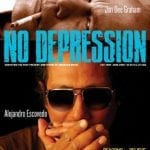Box Full of Letters from Issue #63
Many happy referrals:
One new reader at a time
I learned about No Depression magazine in a rather strange sort of way. I have been a subscriber to Bluegrass Unlimited ever since it began in the 1960s. A couple of years ago more or less, one of the writers named Murphy Henry had an article about the comedy team Jamup & Honey that were on the Grand Ole Opry in the 1940s. In it she mentioned the publication No Depression. I said, Hay, that sounds like a magazine I might like so I wrote her a letter and she sent me a subscription card and now I am a subscriber.
I will be 84 years old May 23, 2006, and I know a lot about the Great Depression of the 1930s-40s. I was a farm son of a sharecropper here in Oklahoma.
I really like your magazine a whole lot. I have seen Art Stamper and also Mac Wiseman at bluegrass festivals here in Oklahoma. Mac’s story in the last issue was really great. I hope you continue such articles in the magazine in the future.
— Bill Richardson
McAlester, Oklahoma
Geraint Watkins:
Welsh, not English
Great to see Tres Chicas in the new magazine; I saw them on their UK tour last year. I just wanted to correct one, albeit small, mistake in the article. Geraint Watkins, a great musician who appears on the new CD, is not English but Welsh. Big difference. Maybe that’s why I’m not crazy about the new tagline about “American music” — the little guys get swallowed up by the big guy. Sounds like there’s no room for Canadians (Be Good Tanyas), or Aussies (Kasey Chambers), let alone the Welsh! That apart, Dw i’n hoffi No Depression iawn. ( I really like the mag!)
— Julia Parry
Tregaron, Ceredigion, Wales
Soundtracks:
In defense of Newman
Kurt B. Reighley reveals an ignorance of film music with his rant saying “mix tape” soundtracks deserve an Oscar of their own. His idea that Randy Newman can “fart through a kazoo” and win yet another Oscar, while these compilation soundtracks miss out, is muddle-headed thinking and just plain wrong.
Newman had sixteen nominations for best soundtrack and song, losing out year after year to hacks, until it became a running joke. When he finally beat John Williams et al., it was with a forgettable song.
Compilation soundtracks have been used increasingly since Easy Rider, as they’re an easy way to win over an audience or demographic (especially when the rest of the film is lacking). Brokeback Mountain is a fine collection, and often — Divine Secrets Of The Ya-Ya Sisterhood, say — the compilation is better than the movie.
But this approach to film music is about marketing, not music making. Newman and all the film composers work in a long-respected art form. The lazy way often makes for special moments, but let’s not compare apples with oranges.
— Chris Bourke
Wellington, New Zealand
Jackie Greene:
Of megahertz and men
Shortly before the arrival of the March-April issue (#62) of No Depression, I aimlessly found the music of Jackie Greene. “Thing Called Rain” derailed my heart immediately. Like Jeffrey Foucault’s “Miles From The Lightning” or Darden Smith’s “Driving Rain” it is a song that will enchant nerve endings in your soul. Songs that were meant to stir up stagnant radio and minds.
Mr. Greene’s musical spectrum is vivid, thoughtful and heartbreaking. From the blues-tinted “Messin’ With The Kid” to the folk/country sound of “Gone Wanderin'”, “Sweet Somewhere Bound” and the Tom Waits feel of “Falling Back”, Mr. Greene never fails to satisfy. It was wonderful to see Jewly Hight review him in this issue.
I wish Mr. Greene had stuck with the title Radio Myth, I think it adds to his idea of the desolate American and monopsony radio. The radio listener of today (i.e. small-market radio like my hometown) could be the kind of character you would have found in John Steinbeck’s Of Mice And Men, or the movies I Am Sam or What’s Eating Gilbert Grape — the idea of societal neglect and aloofness these characters feel and make you feel, as if life has forgotten them.
Corporate radio has not only ruined the radioscape for artists, it has created a vast graveyard for the listener’s ear, giving payola the legalization it needs. Only the select few or flavor of the week benefit. Sadly the basic tool that helps build musicians is the same sword or weapon that radio stations use for the big kill, to help pay bills, the hunter-gatherer game. To the DJ it is not about the music, although that is what the listener is craving (at least I am).
In closure, I would hate to see Mr. Greene shy away from playing the harmonica because of the fear of being labeled blues. He is a terrific harp player to begin with; I do not consider Bruce Springsteen a blues player, or Bob Dylan. They use it as an instrument of folk or expression or blues if it is fitting. If it helps tell the story or emphasize feeling or mood, then what the hell!
— Scott Michael Anderson
Windsor, New York




